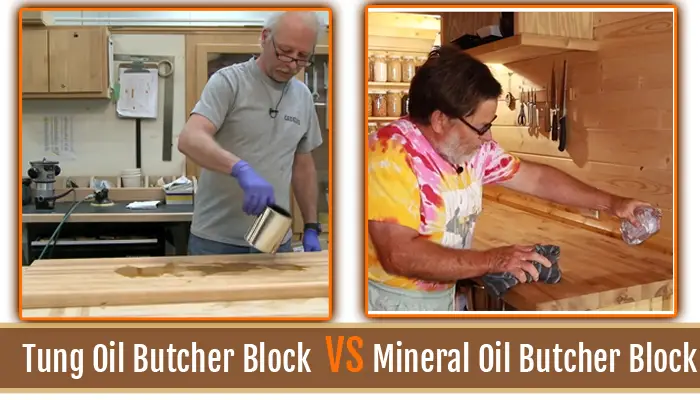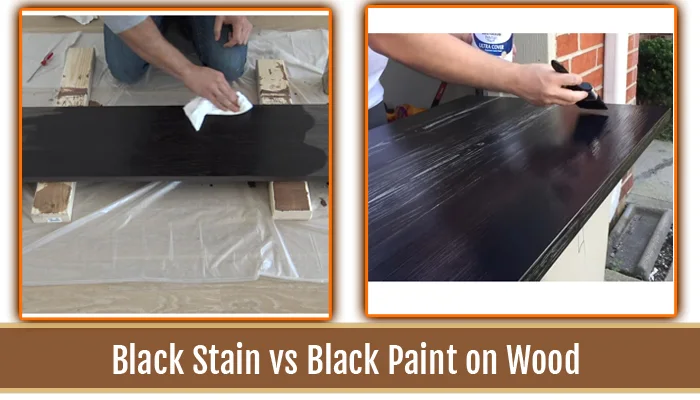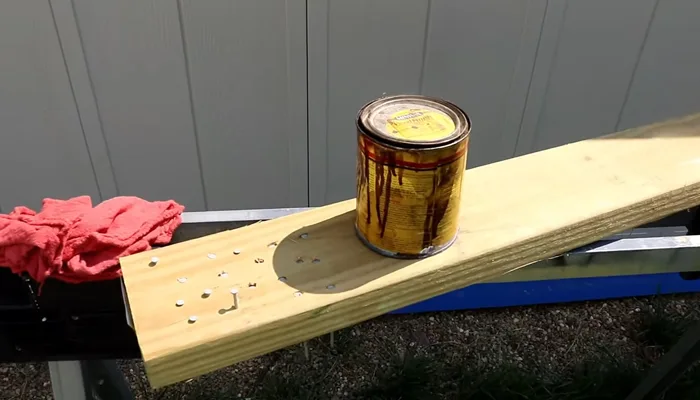WoodenuKnow.com is a participant in the Amazon Services LLC Associates Program, an affiliate advertising program designed to provide a means for sites to earn advertising fees by advertising and linking to Amazon.com and may earn from qualifying purchases.
A butcher block countertop comes with a large, flat surface to cut and process food. It is a type of slab made from hardwoods. With butcher block cutting boards, you can shred vegetables, slice meat, and more.
If you don’t finish the Butcher Block, it will eventually dry out and crack. Tung Oil and Mineral Oil are both finishes that can protect the Butcher Block from drying out and cracking.
But in comparison between tung oil vs mineral oil butcher block, which one is the better finish? Here we will discuss the details of each finish and which one might be the best option for you.
What is Tung oil?

Tung oil is a drying oil derived from the seeds of the Tung tree. This board oil is also known as China wood oil. It has been used for centuries in China for wood finishing and wood protection. Tung oil is often used in combination with other wood finishes, such as varnish or shellac.
When applied to wood, this board oil penetrates deeply and dries quickly, creating a hard, protective coating. Tung oil is also waterproof, which makes it perfect for protecting outdoor furniture.
In addition to its protective qualities, tung oil also enhances the natural beauty of the wood grain. By applying correctly, tung oil can give wood a rich, lustrous finish that lasts for years.
Different Types of Tung Oil for Butcher Block
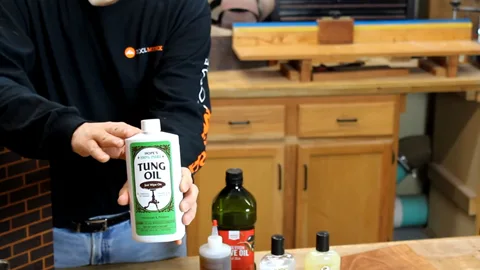
There are three main types of tung oil that are used for butcher blocks: pure tung oil, dark tung oil, and polymerized tung oil. Let’s explore these three types in more detail.
Pure Tung Oil:
Compared to other types of oil, pure tung oil is the least processed and provides the best protection against moisture and wear. When pure tung oil is applied to a butcher block, it penetrates deep into the grain to protect it from within.
It is highly resistant to water and moisture, so it won’t cause the wood to warp or swell. Antifungal and antibacterial properties make it ideal for use in the kitchen.
In addition, pure tung oil is non-toxic and safe for food preparation. It’s the perfect way to maintain the look of your butcher block and prevent bacteria from growing. Pure tung oil can also be mixed with other finishes, such as beeswax, to create a beautiful and protective finish for the butcher block.
Dark Tung Oil:
Dark tung oil is a type of tung oil that has been further processed to create a darker, more durable finish. It is VOC-free, distillate-free, and additive-free, making it a great choice for consumers looking for a safe and environmentally friendly option.
In addition, dark tung oil is food grade, making it safe for use in kitchens. Dark tung oil is also highly resistant to abrasion and acids, providing a tough surface for Butcher Block.
Polymerized Tung Oil:
Polymerized tung oil is another type of oil. it creates a hard, high-luster finish that is very durable. In addition to its beauty and durability, polymerized tung oil is also water-resistant and heat-resistant, so it is an excellent option for kitchens.
It can also be applied in thin coats, which helps to reduce the risk of bubbling or peeling. When properly applied, polymerized tung oil can provide a beautiful, long-lasting finish for your butcher block.
Advantages of the Tung Oil Butcher Block
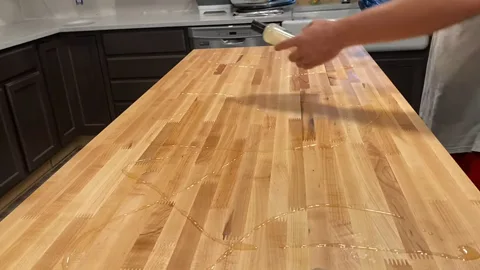
There are many advantages of using tung oil on your butcher block. These advantages are:
Elastic Finish:
Tung oil is an elastic finish, meaning that it is able to expand and contract with the wood as it changes temperature and humidity. Tung oil butcher blocks have an elastic finish that prevents the finish from cracking or peeling over time.
Waterproof Finish:
Applying Tung oil to a butcher block is a great way to finish the wood and protect it from water damage. However, it is important to properly seal the tung oil in order to prevent it from peeling or flaking off. One way to do this is to apply a waterproof finish over the top of the tung oil.
This will help to keep the tung oil in place and prevent it from being removed by water. Waterproof finishes can be applied with a brush or a sprayer. Once the finish is dry, it will create a barrier that keeps tung oil from water damage.
Mold Resistant Finish:
After you’ve used tung oil to finish your butcher block, you’ll want to get a mold resistant finish. This will preserve your butcher block’s appearance and prolong its life. The best method of doing this is by applying a layer of polyurethane.
Yellow Resistant Finish:
Butcher block is a popular choice for countertops, due to its durability and natural beauty. However, one downside of butcher block may yellow over time, particularly when exposed to sunlight. Tung oil is often used as a finish for butcher block, as it helps to protect the wood and prevent yellowing.
Acids and Alcohol Resistant Finish:
Acids and alcohol can ruin the finish on your butcher block, but there is a way to protect it. Using tung oil to finish a butcher block will create a durable, acid and alcohol resistant finish.
Food-safe:
It can be difficult to keep the wooden surface clean and free of bacteria. One way to ensure a food-safe surface is to use Tung oil. As a result, Tung oil is an ideal finish for butcher block countertops. Please note that Tung oil is regularly reapplied in order to maintain its protective properties.
Deep Satin Sheen:
After using tung oil on the butcher block, it will have a satin sheen. This is because the oil penetrates the wood, filling in the voids and providing a smooth surface. Using a clean cloth, you can achieve the satin sheen.
This gives the wood surface a slight shine without making it too slippery. Furthermore, the Tung Oil will help to protect the butcher block from water damage and staining. Thus, it is an ideal oil finish for kitchen surfaces that see a lot of use.
Disadvantages of the Tung Oil Butcher Block?
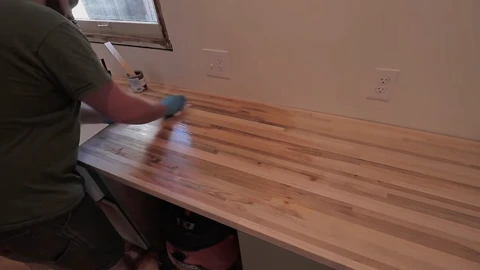
While there are numerous advantages to using tung oil on a butcher block, there are a few disadvantages as well. Lets take a look at some of the disadvantages of this type of finish.
Unpleasant Low Odor:
Tung oil is a very popular wood sealant, but it does have a few disadvantages. It has a low odor for only a few days after application. The problem arises when you’re using it to seal a counter top or other surface where you’ll be working with food.
Sticky Finish:
The sticky finish is the main disadvantage of the Tung oil butcher block counter top. It takes a few days for the sticky finish to dissipate, and during this time, your counter top will be unusable. A sticky finish is also known to attract dust, dirt, and grime, so it’s important to keep your counter top clean and free of debris.
Time Consuming to Remove Old Finish:
One of the potential disadvantages of using a tung oil butcher block is that it can be time consuming to remove the old surface before applying the oil. Additionally, you will need to sand and clean the surface which can add to the amount of time required to complete the project.
What is Mineral Oil?
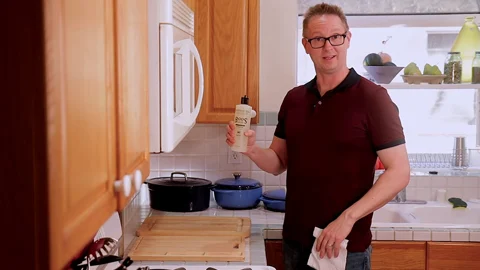
Mineral oil is a clear, colorless oil composed of hydrocarbons. It is derived from petroleum and is commonly used as a lubricant or a laxative. You can’t use coconut oil, olive oil, and vegetable oil as a wood finish.
This non drying oil is popular for butcher block counters because it doesn’t darken the wood grain with time. In addition, it helps keep wood free from stains, making it easier to clean surfaces.
However, mineral oil must be reapplied regularly to keep the butcher block countertop protected. For these reasons, mineral oil is best suited for lower-traffic areas such as prep stations or storage areas.
Different Types of Mineral Oil for Butcher Block
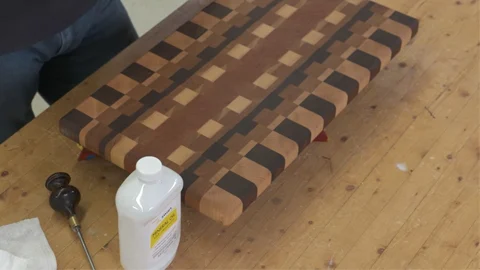
There are two types of mineral oil used in food preparation: food grade and pharmaceutical grade.
Food Grade Mineral Oil:
Food grade mineral oil is most commonly used on a wooden cutting board. Applying a food grade mineral oil to your butcher block can keep it looking its best. Not only does it help to stay dry and staining, but it also makes it resistant to scratches and wear.
The best way to apply mineral oil is to pour a small amount onto a clean cloth and rub it into the wood in a circular motion. Be sure to wipe away any excess oil, as this can make the surface of your butcher block appear slippery. With regular maintenance, your wooden butcher block will stay looking like new.
Pharmaceutical Grade Mineral Oil:
Pharmaceutical grade mineral oil is a higher quality oil that is used in medical and food preparation applications. This type of oil offers better protection against water damage and staining than food grade mineral oil. In addition, it doesn’t need to be reapplied as often.
If you’re looking for the best possible protection for your butcher block, pharmaceutical grade mineral oil will do the trick. However, it is more expensive compared to food grade mineral oil.
Advantages of the Mineral Oil Butcher Block
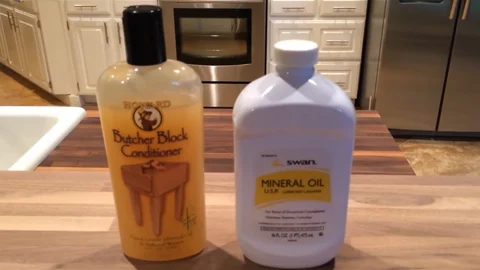
There are several advantages to using mineral oil on your butcher block. When you know these advantages, it will be easy to see why this works for your kitchen.
Food Safe:
When it comes to the kitchen, a major consideration is food safety. After all, the last thing you want is for your family to get sick from eating contaminated food. That’s why so many people choose mineral oil butcher block countertops for their kitchen.
Mineral oil is a highly effective food safe that helps to keep bacteria and other contaminants at bay. So if you’re looking for a countertop that will help to keep your family safe, try a mineral oil butcher block.
Non-Toxic:
For those of you who are familiar with the mineral oil butcher block, you know that it is one of the most popular options for kitchen countertops. It is not only beautiful but also non-toxic.
This means that it is safe for use in food preparation areas. As a non-toxic surface, the mineral oil butcher block is an ideal choice for families with young children or pets.
Natural Grain Finish:
This butcher block finish allows the user to see the beautiful wood grain patterns in the board, making it both stylish and functional. The mineral oil is applied very thinly so that it does not affect the look or feel of the wood.
The natural grain finish of the mineral oil butcher block makes it a popular choice for many homeowners. Not only does it add a touch of style to your kitchen, but it is also a very practical choice.
Odorless:
The odorless characteristic of mineral oil is an advantage over other options like carnauba, raw linseed oil, or boiled linseed oil because there is no risk of the nauseating smell of these other products leaching into your food. This is especially important for those with sensitive noses or who are preparing food for others.
With mineral oil, you can be confident that your butcher block is odor-free. For these reasons, odorless mineral oil is the best option for keeping your butcher block in pristine condition.
Deposits No Color:
Mineral oil butcher block does not deposit color. It won’t change the color of your wood countertop over time as other oils can. If you want a top that will maintain its original beauty, consider a mineral oil butcher block.
Disadvantages of the Mineral Oil Butcher Block
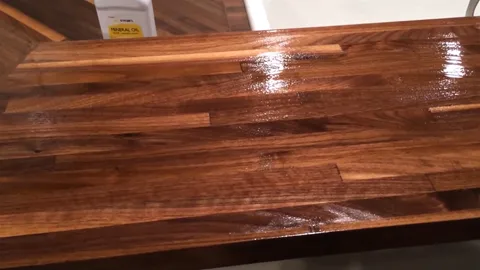
Besides the advantages, there are a few drawbacks of the mineral oil butcher block.
Requires Routine Maintenance:
One downside of the mineral oil butcher block is it needs regular maintenance to keep it looking its best. Without routine maintenance, the butcher block will become stained and discolored.
Not Overly Durable:
While the mineral oil butcher block is very durable, it is not indestructible. They are less scratch resistant and less water resistant, meaning they will not last as long as other types of butcher blocks. This can be a problem if you are planning on using your butcher block for a long time or if you need it to be very durable.
Tung Oil Vs Mineral Oil: Which Finish is Best for Your Butcher Block?
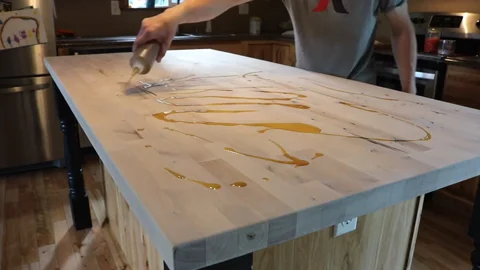
Now that we’ve gone over the pros and cons of each finish, you may be wondering which is the best choice for your butcher block. Well, there are a few factors to consider on each wood oil.
If you are looking for a durable oil finish that will last a long time, tung oil is the better choice. Moreover, if you want a finish that is more water resistant and scratch resistant, tung oil is the way to go.
However, if want an odorless and non-toxic finish, mineral oil is the better choice. It is easy to apply and doesn’t require routine maintenance as tung oil does. So, which is the best finish for a butcher block? It all depends on your individual needs and preferences.
FAQs:
Q: Can You Put Tung Oil over Mineral Oil?
It is possible to apply tung oil after using mineral oil, but it is not necessary. Tung oil is a natural drying oil that will harden and protect the wood from water damage. Mineral oil will suffice if you are simply applying it to keep the wood from drying out. Mineral oil can be applied directly to the wood.
Q: Does Mineral Oil Darken Butcher Block?
Mineral oil is a natural oil to protect and enhance wood surfaces. Although mineral oil does not darken the wood, it can give it a deep, rich luster. Regular applications of mineral oil will help to keep your butcher block looking its best.
Q: Can You Put Polyurethane Over Butcher Block Oil?
The answer is yes, but there are a few things to keep in mind. Make sure that the butcher block oil is completely dry before applying the polyurethane. Apply a thin coat of polyurethane, and be sure to let it dry completely before adding another coat.
Q: How long Does Tung Oil Need to Dry before Applying Polyurethane?
You can, but it will take 7 to 10 days for the butcher block oil to fully cure. Polyurethane can be applied once the butcher block oil is cured. If you put polyurethane over the butcher block oil too soon, the polyurethane will not adhere properly and may cause finishing issues.
Conclusion:
Butcher blocks are a great addition to any kitchen. They are durable, easy to food safe, and offer a variety of benefits. However, before you purchase a butcher block, it is important to know the details of each type of wood finish.
If you compare tung oil vs mineral oil butcher block finishes, you’ll find that each has its own advantages and disadvantages. Tung oil is more durable and water resistant, but it requires routine maintenance. Mineral oil is non-toxic and easy to apply, but it is not as durable as tung oil.
We have tried to show you both the positives and negatives of each type of finish, so you can make an informed decision about which one is right for your needs.

